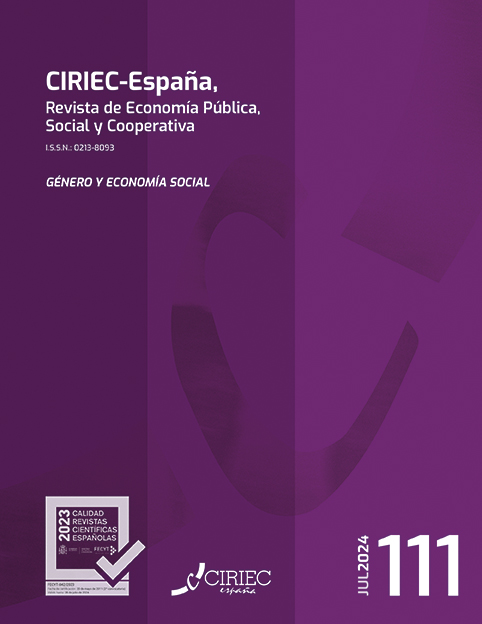The right to work-life balance in Portuguese cooperatives. A legal and empirical analysis
DOI:
https://doi.org/10.7203/CIRIEC-E.111.28037 Resumen
Resumen
This paper aims to assess whether cooperatives are the ideal setting for promoting the work-life balance, a right whose protection has been built in close connection with the promotion of gender equality. To this end, we intend to answer the following questions: (i) What are the main dimensions of the right to work-life balance, and what is the relevance of protecting this right to promote gender equality? (ii) To what extent can the legal regime of cooperatives promote the right to work-life balance and, consequently, gender equality? (iii) What are the main facilitators and obstacles to work-life balance in cooperatives from the perspective of women and men?
From a methodological point of view, our study is based on a review of the literature, legislation, and an empirical study. The empirical analysis was based on the results of a questionnaire survey, which yielded 414 valid responses from employees of SEEs, including 62 from cooperatives. The statistical methods followed were descriptive statistics, non-parametric tests and post-hoc tests. The findings shed light on the specific challenges faced by employees in cooperatives regarding work-life balance and highlight the importance of open and supportive
communication channels within the workplace and flexibility in time management. The results also suggest that cooperatives, according to the perception of employees, are the ones that promote more facilitators and that their organisational culture and climate are favourable to fostering a healthy work-life balance. The observed outcomes can be primarily attributed to the democratic and participatory management inherent in cooperative structures.
 Descargas
Descargas
Descargas
Publicado
Cómo citar
-
Resumen106
-
PDF65
-
XML 0
Número
Sección
Licencia
El Copyright será de CIRIEC-España, revista de economía pública, social y cooperativa, a los solos efectos de favorecer la difusión de los artículos publicados (firmar contratos de difusión, de integración en bases de datos, etc.). Los autores también mantienen el copyright sobre su obra y pueden depositar su artículo en el formato electrónico oficial de la revista en su página web personal y en los repositorios institutionales de su grupo de investigación. No obstante, se autoriza la reproducción y distribución de todos los artículos publicados, siempre que no se modifique el contenido y se indique su origen (CIRIEC-España, revista de economía pública, social y cooperativa, número y dirección electrónica del documento o DOI). El envío de un artículo a CIRIEC-España, revista de economía pública, social y cooperativa supone la aceptación de estas condiciones.



